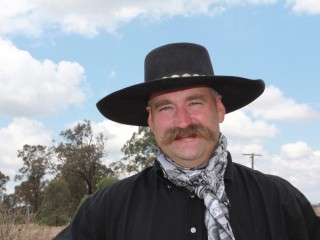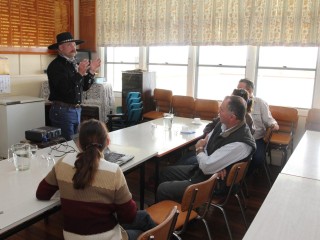 Twelve years ago something happened that compelled Nebraska farmer Trent Loos to stand up and speak out on behalf of his industry.
Twelve years ago something happened that compelled Nebraska farmer Trent Loos to stand up and speak out on behalf of his industry.
“I got pissed off,” he says bluntly.
The sixth generation rancher attended a PETA-organised event in South Dakota where movie actor James Cromwell urged a group of 300 ranchers to stop farming livestock. The actor told the gathering that after making the movie Babe, he believed that pigs should be our friends, not our food.
Trent says something snapped inside. “That was the day that I said I’ve got to stop complaining about people and what they don’t know, and find a way to get them what they should know.”
So he started talking. Talking to people in his supermarket, his gas station, his tyre repair shop, anyone he could find that wanted to talk about why we need animals in agriculture. His message resonated and his audience grew, leading to regular radio shows, newspaper columns and now a full-time speaking career.
He now speaks in 40 US states each year, as well as Canada. Last week he addressed the Australian Lot Feeders Association annual conference in Toowoomba and a Meat and Livestock Australia Agvocacy day at Durong in Southern Queensland. He was invited to Australia after nutritionist Matt George saw him speak in San Diego and urged MLA to fly him out to talk to farmers here.
The grassroots agricultural advocacy movement – or Agvocacy as it has been aptly branded – is only just gaining momentum in Australia, but in the US the concept of farmers proactively sharing their stories has been growing for the past decade.
Trent was one of the first farmers in the US to start actively advocating on behalf of agriculture, and has since been joined by thousands of others in the campaign to counter the spread of misinformation about farming.
His main message is simple: agriculture is about improving human lives, but a lot of people are trying to distract the public’s attention away from that.
“We want people to get facts about food, celebrate the fact that we can make choices in our food, but to make sure the information that is presented is factual.”
Good advocacy comes down to good listening, he says, offering a story to illustrate. Last week he was travelling with Matt George at Dalby and was checking out of the hotel when the receptionist spoke about the cattle going passed on trucks. “She said I feel sorry for them and I know the fate at the end of that trip,” Trent recounted.
“Well Matt could have walked away, but instead, partially because he had been running with me all week, he engaged in a two-minute conversation, explaining that is the purpose of the cattle, the cattle consume forages that other people can’t utilise, and then because of the food, fibre, pharmaceuticals and fuel that we get from the cow, we improve human lives.
“Being a good listener, you hear people say things that will open the door to a conversation.”
He says everyone in agriculture should have the confidence to talk about what they do and why they do it. It could involve using social media to make connections with urban residents, but most importantly, he says, it simply involves engaging in one-on-one conversations whenever the opportunity arises.
 We are experts in our own experiences, and, who better to tell our stories than us, he asks.
We are experts in our own experiences, and, who better to tell our stories than us, he asks.
Yet for some reason, people in agriculture have been reluctant to speak out, feeling they’re not quite ready, not quite qualified.
And while they have remained quiet, the people who have been talking about agriculture are those with an anti-farming agenda.
He said that when he first started advocating, farm groups in the US took the view that they could not directly address or combat negative claims about farming, because to do so was to give them credibility.
“In the US we took that approach for 10 years, so for fear of giving them credibility we allowed them to have an open mike and an open platform.”
Activists banked on farmers feeling too intimidated to speak out, he said. “When you have a degree of confidence, when you’re an expert in your own experiences, and you’re willing to say what you think, they will seek lower hanging fruit.”
Trent says he didn’t truly learn how to be an advocate for agriculture until he put himself in the very uncomfortable position of attending and speaking at animal rights meetings.
“I’ve been in meetings where I’ve had a thousand people against me, all wanting a piece of me.
“Until you get to the point where you begin to question what it is that you’ve always believed in, and then you answer that question, it is like an awakening for you.
“It teaches me how to be a better advocate, because I understand what misinformation led them down the path of forming the opinion that they did.
“Going and spending time with them and being a good listener, I learned how we need to do a better job of preventing more people being in their camp.”
He wants more people to do the same thing, but even those not comfortable with such a confrontational approach can still play an important role by engaging in face to face conversations about agriculture with people in their local communities.
“It is your action that makes the difference in just stepping forward,” he said. “ You don’t need to be in front a civic group, you can just do it one person at a time, in a hotel, in a country club, whatever the case may be.
“Nothing is better than simple eye to eye contact, face to face conversation. These messages have the biggest impact and resonate the longest.
“There is no magic formula. It is just about giving people the confidence to take the opportunity when it arises,” he said.
Asked if felt agriculture was winning the battle, he felt it was “holding its own”.
“I think we’re in the best position that we’ve been in because we’ve engaged more people in the process.
“They make their living planting seeds of doubt, we make our living doing the right thing, but really don’t carve out any time to counter what the other people spend all their time doing.
“What I say is we have to add to the chore list – being an advocate is one of those daily chores we have to have on our list."
RELATED ARTICLE: Agvocacy flies high at Durong pilot workshop
